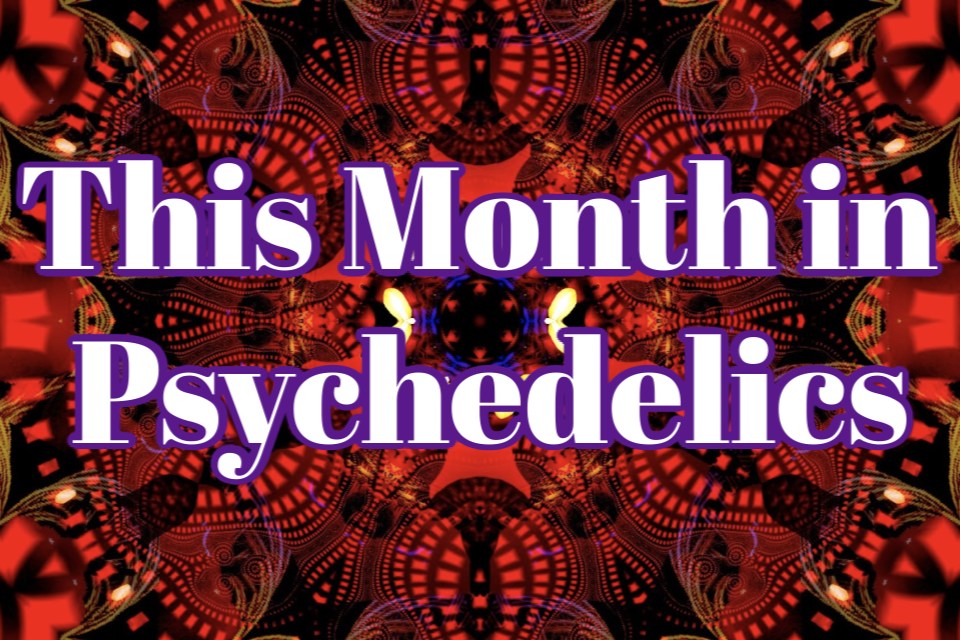A lot happened in the world of psychedelics in February. A southern U.S. state legalized medical marijuana, scientists created a new way to make 5-MeO-DMT, a follow-up study found psilocybin therapy was an effective treatment for major depression for one year, zebrafish microdosed LSD, and the NFL invested $1 million into cannabinoids.
There’s a lot to get through this month, so without further ado, let’s jump into the news:
Policy
Wins
Southern states have been among the last to warm up to cannabis policy reforms, but Mississippi legalized medical marijuana for people with qualifying debilitating conditions like cancer or sickle cell disease. The law went into effect but it may still be several months before dispensaries will open.
Future
Following last month’s news about the DEA trying to criminalize five more psychedelics, a judge granted a hearing for opposition to the proposal. It will take place in May.
Industry
The recent explosion of interest surrounding 5-MeO-DMT has put a strain on the population of Sonoran Desert toads, which has been under threat of being wiped out because of their highly sought-after psychedelic venom. However, scientists may have found a solution to help conserve the species—a new way to farm 5-MeO-DMT that doesn’t involve milking toads. To make matters even better, the company behind this discovery plans to operate in the spirit of open science by supplying other companies with free samples of the substance as long as they make a commitment to open science.
Sustainable iboga is hard to find in the West, but Gabon has taken the first step toward setting up a legal distribution channel for the plant. In this model, participating villages will work alongside Gabon’s Ministry of Forests, a North American iboga therapy center operator, and the NGO Blessings of the Forest.
Money changed hands from the profit sector to a non-profit company this month as MAPS became the beneficiary of a handsome $500k donation from atai Life Sciences’ philanthropy arm, atai Impact.
Research
Published Studies
Ravers and festival-goers often refer to experiencing the dreaded “comedown” after taking MDMA, but a new study indicated that the drug itself doesn’t actually cause comedowns. Instead, factors such as the unknown purity of illicit substances, lack of rest, and becoming dehydrated can contribute to whether they occur or not.
The jury’s still out when it comes to whether microdosing is effective or just a placebo, but another trial found no evidence that microdosing LSD does anything. However, a different study found that giving microdoses of LSD to zebrafish may indicate its potential benefits for humans. As always, we need more research. But especially in the case of microdosing.
New research trials looking at using psychedelics to treat depression reported positive results. One follow-up study found that psilocybin therapy relieved major depressive disorder symptoms for up to one year in most patients. Two studies found that ketamine is capable of alleviating depression and quieting suicidal thoughts. And the first-ever clinical trial of DMT for major depressive disorder showed promise.
Cannabis is often blamed for causing people to become lazy and sit around on the couch wasting the day away. But over the last few years, many studies have found the exact opposite. Another one was added to the pile this month, as it found that consuming cannabis does not result in “amotivational syndrome.”
Future Studies
Concussions have been a big topic in the sports world for the last few years. A lot of effort is going into researching what can be done to recover from head injuries, and the NFL made big moves by investing $1 million into cannabinoid research. Two medical teams will investigate how cannabinoids affect pain management and neuroprotection.
Miscellaneous
You may recall that last year a U.S. sprinter named Sha’Carri Richardson was suspended from competing in the 2021 Summer Olympics due to a positive cannabis test. That was bad enough on its own, but this month Richardson suggested there may be a racist double standard at play after the Olympics allowed a Russian skater to compete in the 2022 Winter Olympics even after failing a drug test—for a performance enhancing drug, no less! There are some differences between the two cases, but it does seem a bit questionable, to say the least.
And last up for this recap is a reminder that although psychedelics have the potential of uncovering the truth sometimes, the insights that they give you aren’t always true. It’s tempting to fall into the mental trap of believing that everything you experience while tripping is correct, but if you or someone you know has been feeling that way lately then be sure to check out the linked article above.
That’s all for this month’s update. Remember to always test and weigh your drugs and until next time—keep thinking wilder.
Think Wilder is reader-supported. If you enjoyed this month’s update, please consider helping out by becoming a patron, making a one-time donation, or sharing this post with a friend. Thank you for your support.






